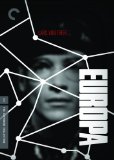| Reviews & Columns |
|
Reviews DVD TV on DVD Blu-ray 4K UHD International DVDs In Theaters Reviews by Studio Video Games Features Collector Series DVDs Easter Egg Database Interviews DVD Talk Radio Feature Articles Columns Anime Talk DVD Savant Horror DVDs The M.O.D. Squad Art House HD Talk Silent DVD
|
DVD Talk Forum |
|
|
| Resources |
|
DVD Price Search Customer Service #'s RCE Info Links |
|
Columns
|
|
|
Europa - Criterion Collection
THE MOVIE:
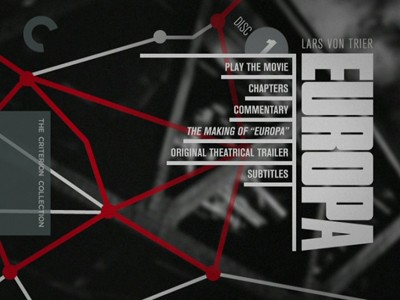
Before Lars von Trier was part of the Dogme 95 movement, living by an avant-garde manifesto that was meant to chip away the artifice of filmmaking and adhere closer to the grittiness of real life, he was actually working on the opposite end of the spectrum. His early films were visually exciting, inventive, and challenging flights of imagination. This includes his 1991 post-War mindbender Europa (a.k.a. Zentropa), a Kafka-esque espionage adventure that tunnels its way into the bleakness of occupied Germany. Bureaucratic nightmares, rickety technology, false identities, and questionable allegiances all converge for a paranoid thriller that has as much to do with the treacherous landscape of the mind as it does our treacherous perceptions of history.
Leopold Tressler (Jean-Marc Barr) is an American sent to Frankfurt in October of 1945 to work alongside his Uncle (Ernst-Hugo Järegard) for the Zentropa Train Company. Leopold is to be a sleeping-car conductor, a clever symbol for the hypnotic journey he will soon be taking. His very occupation is that of ferrying passengers from one place to the next while they sleep. So, too, could all of Europa be a dream. We enter the movie under cover of night, a single light illuminating the train tracks that our eyes scan as the narrative voice of Max von Sydow plants the hypnotic suggestion that will transport us to Germany alongside Leopold.
Immediately upon landing at Zentropa, Leopold discovers a near impenetrable corporate system full of rules, regulations, and many a wheel that needs greasing just to get him started working. Each door he steps through requires another qualification, each person he meets further complicates the situation. Sometimes these discoveries seem part of a larger plot, sometimes they are simply extraneous wrinkles designed to push our hero further into the mire. He meets the Hartmann's, owners and operators of Zentropa--the weary father Max (Jorgen Reenberg), the gay son Lawrence (Udo Kier), and the mysterious daughter Katharina (Barbara Sukowa). Katharina first comes to Leopold on the train, claiming a fear of traveling through tunnels (paging Dr. Freud!), but then invites him over to dinner at the house, where she starts to peel away the layers of her outward persona. Katharina may have at one time been a member of the Werewolves, an insurgency of Germans trying to foil the American efforts to govern their country. Just as he is a man torn between his home country and his ethnic heritage, so is Leopold caught between the politics of a defeated Germany and the restoration/reformation efforts of the Allies. He witnesses a farce organized by the U.S. military leader Colonel Harris (Eddie Constantine) to exonerate Max Hartmann of any Nazi connections, but he is also duped by the Werewolves into making an assassination in the sleeping car possible. Leopold is so tangled up in this intrigue, he doesn't know whether he is coming or going.
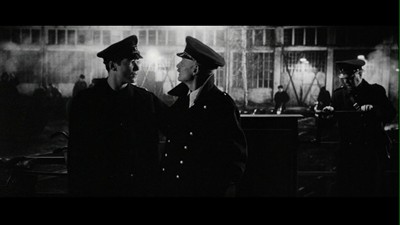
Most of Europa is shot in black-and-white, evoking spy movies of the period, from Fritz Lang's pre-War homeland efforts to Orson Welles vehicles like Journey into Fear. Lars von Trier also uses exaggerated rear projection and subtle splashes of color, creating an effect that is a little something like Guy Maddin visiting Sin City. Red drops of blood tumble through gray baths, while characters flush in emotion suddenly become fully rendered in painterly hues amidst the otherwise two-tone world. The construction of images only adds to the paranoia. von Trier's version of a split-screen phone call puts Leopold in the left part of the screen, in the active/present moment, while Katharina's face is enlarged to take up the entire right side of the screen, appearing as a rear-projected image. When the phone conversation is over, Leopold hangs up the phone and moves out of frame, revealing the werewolf blackmailer (Henning Jensen) listening in, always watching, preying on Katharina in order to force Leopold into committing terrorism.
Europa is surreal in all things: technique, logic, and construction. von Trier's shooting style goes hand in hand with how the story develops, and the world that production designer Henning Bahs builds for Leopold to traverse gives it all shape. The Germany of Europa is like a wasteland, with bombed-out buildings sitting alongside labyrinthine constructs like the Zentropa worker's barracks. Interiors feel desolate, disconnected from the outside world by their decoration, at once looking like movie sets as well as the nightmarish, man-made products of war. In many ways, with the way his camera's movements homage Hitchcock and his audaciousness prefigures Baz Lurhmann, Lars von Trier is drawing a connection between the proliferation of pop culture--specifically, our obsession with movies--and our own interior anxieties. Our anguish over past misdeeds (the Nazis and World War II) comes cloaked in the iconography of old motion pictures, and these cloak-and-dagger images also bring up the lingering anxiousness of the Cold War and a fear of the unstoppable momentum of technological progress. Leopold is both a man of the world, fancying himself able to straddle two cultures, and an outsider, belonging nowhere, just as the 1990s were moving toward mass globalization where individual cultural identities were being celebrated even as the machine gobbled them up. And this was pre-Quentin Tarantino, before talking in pop cultural buzz phrases became de rigueur.
Within these echoes of movies past is Leopold's desire to belong, as well as his romantic yearnings. Katharina captures his heart even as she demands his trust. Here the "Werewolves" name is revealed to me more clever than maybe was immediately apparent: as a lover, Katharina is asking the same questions that one would ask as a monster or as a terrorist. Do you trust me not to hurt you? A commitment in any relationship begins with this question, whether it is articulated or not. And in movie fantasies, getting the girl and saving the day and coming out unscathed are all the same goal. The sticky web of romance and the sticky web of international intrigue? As Humphrey Bogart taught us, it's all the same thing.
Of course, Bogie wouldn't be as out of his element as Leopold is. The lie of the movie fantasy is that we'd be more confident in the midst of the concocted plot than we would be were it happening to us in real life. Leopold never knows what to do, is indecisive, and is subject to the caprice of those who would use him to their own ends. Caught between his desires and various regimented moralities, none of which seem right, Leopold could become hopelessly lost. To push the movie metaphor further, Katharina chastises him by saying that since he was not actually in the war, he is not really in a position to judge those who were. He hasn't lived it, he has only observed from afar, so how could he possibly understand what any of this means?
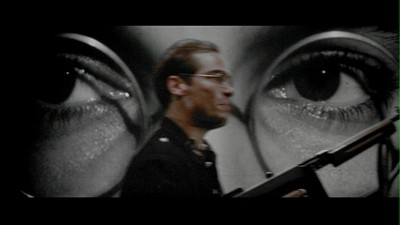
It's this accusation that pushes Leopold toward his final decision and puts the climax of Europa into motion. Leopold simultaneously becomes the voyeur and the man of action. In the foreground, he appears in color with a rifle; in the background, the black-and-white insertion of his own eyes watching him. I seem to recall similar eyeball imagery in Steven Soderbergh's Kafka (and, of course, Hitchcock's Spellbound), but in the explosive finish of von Trier's movie, he is evoking Orson Welles' movie of The Trial more than Franz Kafka's original novel. Welles removed a layer of humanity by blowing up Anthony Perkins, whereas Kafka gave his Joseph K. a death by human hands. von Trier goes one better by moving outside of the train and leaving it ambiguous as to whether Leopold finally did act or not. Was what happened intentional, or was it an accident? The final piece of the dream, the MacGuffin of the mental sphere, is snatched from us. The hypnotist returns, but he tells us we will not wake up from this. It's the big sleep, as it were.
Despite Lars von Trier's reputation as a difficult director, the refreshing thing about Europa's meta-narrative is that von Trier never steps so far beyond his audience that he looks back to smugly admire the intellectual distance that he has put between himself and the viewer. Rather, by wrapping this unconventional story in conventional trappings, he has created a comfortable zone for the viewers to appreciate what he is doing. The toys are familiar even if the playground is not. Thus, though Europa picks at our brain and challenges us to find our way through its maze, the way it keeps us guessing like any other wartime mystery doesn't make the puzzle-solving daunting. Rather, like the true masters of suspense, the pleasure is in the pondering, and thus it's all the more fitting that the entirety of the movie takes place all within the viewer's mind. A filmmaker is nothing but a hypnotist, after all, lulling you into a state where you believe that what you are seeing is real. (All the more fitting that von Triers' Hitchcockian cameo is as the lying Jewish collaborator who falsely exonerates Max.) To provoke, to intrigue, these are von Trier's goals, and though he would employ harsher methods in the years to come, Europa is no less stunning for the ease with which it goes down.
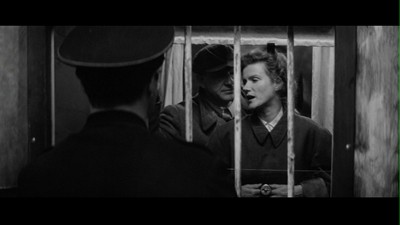
THE DVD
Video:
Criterion has brought Europa to DVD in its 2.35:1 aspect ratio, and it's a flawless transfer. No scratches or marks, no dirt, and great tonal values on the black-and-white photography. The image looks as crisp and fresh as the day it was first printed.
Sound:
The soundtrack for Europa is in both German and English, and it's mixed here in stereo with optional English subtitles for the German parts. (There is also a subtitle option for the deaf and hearing impaired.) The mix on the picture is as good as the video quality, with excellent tones and strong clarity regardless of volume.
Extras:
The Criterion Collection release of Europa is a 2-disc set, housed in a clear plastic keepcase with a staggered double tray that holds both discs. The interior booklet has photos, a chapter and cast listing, and a new essay by critic Howard Hampton.
DVD 1 has the full feature, with an optional audio commentary by director Lars von Trier and producer Peter Aalbaek Jensen, recorded in Danish and subtitled in English. (Due to the requirements of both an alternate audio track and an alternate subtitle track, you cannot toggle into the commentary during the film, it must be selected in the menu.) The pair discuss the business and creative hurdles that went into making Europa, looking back with a wry, self-deprecating eye. It's a strong track, informative and recorded far enough from the original production to give the speakers some perspective on how it all came together.
The 39-minute 1991 documentary "The Making of Europa" is surprisingly thorough for its vintage, looking at Europa's place in von Trier's "E trilogy" (The Element of Crime and Epidemic are its thematic siblings), the inspiration he took from a children's book for the train elements, his careful storyboards, and the challenge of the stylized filming. The documentary follows the production both to its location shooting in Poland and the studio work in Denmark. The video quality is a bit worse for wear, but it's still quite good.
The first disc finishes with the original theatrical trailer.
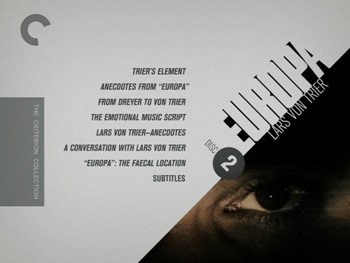
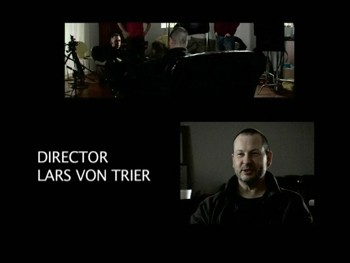
DVD 2 opens with another 1991 documentary, the 44-minute "Tier's Element." This Danish production focuses more heavily on von Trier, using a long interview with him as the spine for the program. There is also on-set footage from Europa and footage from its Cannes debut. The featurette finishes with the initial shooting for von Trier's Dimension, a project to be shot over 30 years and, at least at this early juncture, featuring Eddie Constantin, Udo Kier, and Jean-Marc Barr. (This project is apparently currently still going, with three minutes being shot each year sometime around Christmas.)
The 2005 piece "Anecdotes from Europa" (20 minutes, 30 seconds) collects critic Peter Schepelern, actor Barr, and various crew members to reminisce about making the film. These short pieces from the various speakers cover a variety of subjects, from von Trier's intent through financial issues and shooting in Poland to the special effects with water. Interesting, but a bit scattershot. A similar approach is applied in "Lars von Trier - Anecdotes" (16:50), wherein some of the same participants as well as some new faces talk about Lars, from film school and on into his early filmmaking reputation.
Longer pieces with specific members of the Europa team are a tad more illuminating. Cinematographer Henning Bendtsen ("From Dreyer to Von Trier," 13:30) discusses how two of Denmark's greatest directors bookend his career, while composer Joachim Holbek ("The Emotional Music Script," 12:00) describes coming out of ballet to do film and his work on Europa. von Trier himself sits down in a 2005 interview (43 minutes) to go over his intention with the "Europa Trilogy." He goes from the origin of the Trilogy collaborating with writer Niels Vorsel and the influence of Tarkovsky through Europa, looking back over the trio as a complete effort, and how its completion pushed him to change his filmmaking style.
The grossest is saved for last. The 10-minute short film "Europa - The Faecal Location" documents the problems of the toilets on the film set in Poland and shows us rare, previously unseen footage of said toilets. Like the "Dogville Confessions" short but with poop.
FINAL THOUGHTS:
Highly Recommended. Lars von Trier is always a challenging director, but his 1991 film Europa shows that he is just as good at provoking a response utilizing conventional filmmaking as he is in dismantling it. The surreal story of an American going to work in Germany after WWII takes us into labyrinthine bureaucracies, heightened emotional states, and international intrigue. It's a love story, a spy story, and a crazy train trip through the human mind all wrapped up in one stylish package. The Europa - Criterion Collection double-disc set also comes packed with illuminating extras, both from the film's release and more recent productions, taking us further into von Trier's dreamy cinematic vision.
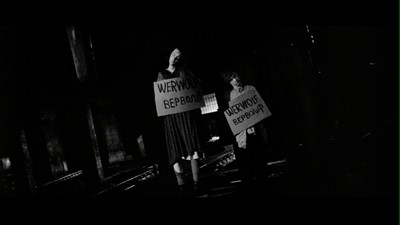
Jamie S. Rich is a novelist and comic book writer. He is best known for his collaborations with Joelle Jones, including the hardboiled crime comic book You Have Killed Me, the challenging romance 12 Reasons Why I Love Her, and the 2007 prose novel Have You Seen the Horizon Lately?, for which Jones did the cover. All three were published by Oni Press. His most recent projects include the futuristic romance A Boy and a Girl with Natalie Nourigat; Archer Coe and the Thousand Natural Shocks, a loopy crime tale drawn by Dan Christensen; and the horror miniseries Madame Frankenstein, a collaboration with Megan Levens. Follow Rich's blog at Confessions123.com.
|
| Popular Reviews |
| Sponsored Links |
|
|
| Sponsored Links |
|
|
| Release List | Reviews | Shop | Newsletter | Forum | DVD Giveaways | Blu-Ray | Advertise |
|
Copyright 2024 DVDTalk.com All Rights Reserved. Legal Info, Privacy Policy, Terms of Use,
Manage Preferences,
Your Privacy Choices | |||||||









